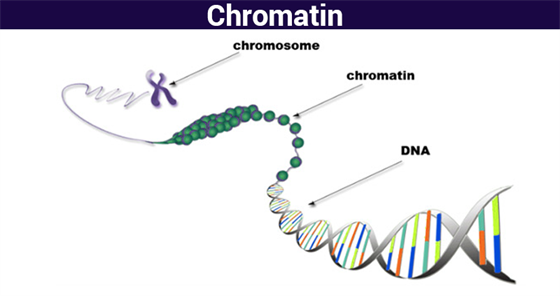
chromatin [kroh-muh-tin] ExamplesWord Origin noun Cell Biology.
- the readily stainable substance of a cell nucleus, consisting of DNA, RNA, and various proteins, that forms chromosomes during cell division.
Origin of chromatin First recorded in 1880–85; chromat- + -in2 Related formschro·ma·tin·ic, adjectivechro·ma·toid, adjective Examples from the Web for chromatin Historical Examples of chromatin
While these changes are going on in the chromatin the Amphiaster forms.
The Ethics of Medical Homicide and Mutilation
Austin O’Malley
Hence the egg must get rid of still more of its chromatin material.
The Story of the Living Machine
H. W. Conn
Of all parts of the cell this chromatin is the most remarkable.
The Story of the Living Machine
H. W. Conn
This we can only believe to be the result of a differentiation in their chromatin material.
The Story of the Living Machine
H. W. Conn
The first indication of the cell division is shown by the chromatin fibres.
The Story of the Living Machine
H. W. Conn
British Dictionary definitions for chromatin chromatin noun
- cytology the part of the nucleus that consists of DNA and proteins, forms the chromosomes, and stains with basic dyesSee also euchromatin, heterochromatin
Derived Formschromatinic, adjectivechromatoid, adjective Word Origin and History for chromatin n.
protoplasm in cell nuclei, 1882, from German, coined 1879 by German anatomist Walther Flemming (1843-1905), from Latinized form of Greek khromat-, the correct combinational form of khroma “color” (see chroma) + chemical suffix -in (2). Related: Chromatid. Cf. chromosome.
chromatin in Medicine chromatin [krō′mə-tĭn] n.
- A complex of nucleic acids and proteins in the cell nucleus that stains readily with basic dyes and condenses to form chromosomes during cell division.
chromatin in Science chromatin [krō′mə-tĭn]
- The substance distributed in the nucleus of a cell that condenses to form chromosomes during cell division. It consists mainly of DNA and proteins called histones.
 Liberal Dictionary English Dictionary
Liberal Dictionary English Dictionary